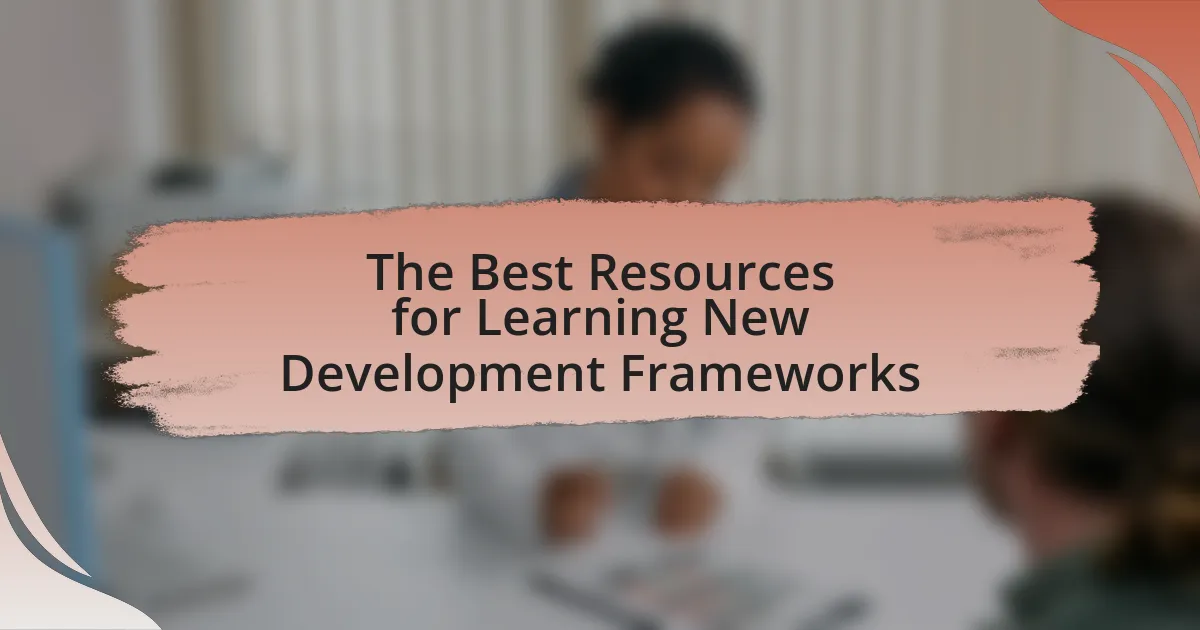The article focuses on the best resources for learning new development frameworks, emphasizing the importance of selecting high-quality materials for effective learning. It outlines various types of resources, including online courses, official documentation, community forums, and books, while discussing factors to consider when choosing these materials. The article also highlights the significance of understanding different learning styles, the role of community support, and the advantages of interactive learning experiences. Additionally, it addresses common challenges learners face and offers strategies for effective learning, including goal-setting, practice, and time management.

What are the Best Resources for Learning New Development Frameworks?
The best resources for learning new development frameworks include online platforms, documentation, and community forums. Websites like Udemy and Coursera offer structured courses on various frameworks, while official documentation, such as that provided by React or Angular, serves as a comprehensive guide for developers. Additionally, community forums like Stack Overflow and GitHub Discussions allow learners to engage with experienced developers, ask questions, and share knowledge. These resources are widely recognized for their effectiveness in teaching new frameworks, as they provide both theoretical knowledge and practical application opportunities.
Why is it important to choose the right resources?
Choosing the right resources is crucial because they directly impact the effectiveness and efficiency of learning new development frameworks. High-quality resources provide accurate information, practical examples, and up-to-date practices, which facilitate a deeper understanding and quicker mastery of the subject. For instance, research indicates that learners who utilize well-structured and reputable materials are 50% more likely to retain information compared to those who rely on inferior sources. Therefore, selecting appropriate resources not only enhances knowledge acquisition but also optimizes the learning process.
What factors should be considered when selecting learning materials?
When selecting learning materials, factors such as relevance to the curriculum, credibility of the source, accessibility, and engagement level should be considered. Relevance ensures that the materials align with the learning objectives and the specific development frameworks being studied. Credibility of the source is crucial; materials from established experts or reputable organizations enhance trustworthiness. Accessibility refers to how easily learners can obtain and use the materials, which can include formats like online resources or textbooks. Engagement level is important as interactive and visually appealing materials can enhance motivation and retention. These factors collectively contribute to effective learning experiences in the context of new development frameworks.
How do different learning styles affect resource selection?
Different learning styles significantly influence resource selection by determining how individuals prefer to engage with information. For instance, visual learners tend to select resources that include diagrams, charts, and videos, as these formats enhance their understanding and retention of concepts. In contrast, auditory learners favor podcasts, lectures, and discussions, which allow them to absorb information through listening. Kinesthetic learners, on the other hand, prefer hands-on resources such as coding exercises and interactive tutorials, as they learn best through practice and application. Research by Fleming and Mills (1992) on learning styles highlights that tailoring resource selection to these preferences can improve learning outcomes, as individuals are more likely to engage with and retain information presented in their preferred format.
What types of resources are available for learning development frameworks?
Various resources are available for learning development frameworks, including online courses, documentation, community forums, and books. Online courses, such as those offered by platforms like Coursera and Udemy, provide structured learning paths with video lectures and assignments. Official documentation from framework creators, like React or Angular, offers comprehensive guides and API references. Community forums, such as Stack Overflow and GitHub discussions, facilitate peer support and knowledge sharing. Additionally, books authored by industry experts provide in-depth insights and practical examples, enhancing understanding of specific frameworks. These resources collectively support learners in mastering development frameworks effectively.
What are the advantages of online courses compared to books?
Online courses offer interactive learning experiences that books cannot provide. Unlike traditional books, online courses often include multimedia elements such as videos, quizzes, and discussion forums, which enhance engagement and retention of information. For instance, a study by the U.S. Department of Education found that students in online learning environments performed better than those receiving traditional face-to-face instruction, highlighting the effectiveness of interactive content. Additionally, online courses frequently allow for real-time feedback and personalized learning paths, catering to individual learning styles and paces, which books cannot accommodate.
How do tutorials and documentation differ in their effectiveness?
Tutorials and documentation differ in their effectiveness primarily in their approach to learning; tutorials provide hands-on, step-by-step guidance, while documentation serves as a comprehensive reference. Tutorials often engage users through practical examples and interactive content, which can enhance understanding and retention of concepts, as evidenced by studies showing that active learning techniques improve knowledge acquisition. In contrast, documentation offers detailed explanations, specifications, and best practices, making it a valuable resource for in-depth understanding and troubleshooting, particularly for experienced developers who need to reference specific functionalities or APIs. This distinction highlights that tutorials are generally more effective for beginners seeking to grasp foundational skills, whereas documentation is crucial for advanced users requiring precise information.
How can community support enhance the learning experience?
Community support enhances the learning experience by providing collaborative opportunities, resources, and emotional encouragement. When learners engage with a community, they gain access to diverse perspectives and shared knowledge, which can deepen their understanding of complex topics. For instance, studies show that peer interactions in educational settings lead to improved problem-solving skills and higher retention rates. Additionally, community forums and groups often share valuable resources, such as tutorials and best practices, which can accelerate the learning process. This collaborative environment fosters motivation and accountability, making learners more likely to persist in their studies and achieve their goals.
What role do forums and discussion groups play in learning?
Forums and discussion groups play a crucial role in learning by facilitating knowledge exchange and collaborative problem-solving among learners. These platforms enable individuals to ask questions, share experiences, and receive feedback from peers and experts, which enhances understanding and retention of new concepts. Research indicates that active participation in online forums can lead to improved learning outcomes, as learners engage in discussions that deepen their comprehension and foster critical thinking skills. For instance, a study published in the Journal of Educational Technology & Society found that students who participated in online discussion forums demonstrated higher levels of engagement and academic performance compared to those who did not.
How can mentorship improve understanding of development frameworks?
Mentorship can significantly enhance understanding of development frameworks by providing personalized guidance and real-world insights. Mentors, who often possess extensive experience, can clarify complex concepts, share best practices, and offer feedback on practical applications. This direct interaction fosters a deeper comprehension of the frameworks, as mentees can ask questions and receive tailored advice. Research indicates that mentorship leads to improved learning outcomes, with studies showing that individuals with mentors are more likely to succeed in mastering new skills and knowledge areas.

What are the Most Popular Development Frameworks to Learn?
The most popular development frameworks to learn include React, Angular, Vue.js, Django, and Ruby on Rails. React, developed by Facebook, is widely used for building user interfaces, particularly for single-page applications, and has a strong community support with over 200,000 stars on GitHub. Angular, maintained by Google, is a comprehensive framework for building dynamic web applications and has a robust ecosystem, making it a preferred choice for enterprise-level applications. Vue.js is known for its simplicity and flexibility, gaining popularity among developers for its ease of integration into projects. Django, a high-level Python web framework, emphasizes rapid development and clean design, making it a favorite for backend development. Ruby on Rails, known for its convention over configuration approach, accelerates web application development and has a strong following in the startup community. These frameworks are consistently ranked highly in developer surveys, such as the Stack Overflow Developer Survey, which highlights their relevance and demand in the industry.
What are the key features of popular frameworks like React, Angular, and Vue?
React, Angular, and Vue are popular JavaScript frameworks, each with distinct key features. React is known for its component-based architecture, allowing developers to build reusable UI components, and utilizes a virtual DOM for efficient rendering. Angular offers a comprehensive framework with two-way data binding, dependency injection, and a powerful CLI, making it suitable for large-scale applications. Vue combines the best of both worlds with a flexible architecture, reactive data binding, and a simple learning curve, making it accessible for beginners while still powerful for advanced users. These features contribute to their widespread adoption in web development.
How do these frameworks differ in terms of functionality and use cases?
Frameworks differ significantly in functionality and use cases, with each designed to address specific development needs. For instance, React is primarily focused on building user interfaces with a component-based architecture, making it ideal for single-page applications. In contrast, Django is a high-level Python web framework that emphasizes rapid development and clean design, suitable for building complex web applications with a robust backend. Additionally, Angular provides a comprehensive solution for developing dynamic web applications, offering features like two-way data binding and dependency injection, which are beneficial for enterprise-level applications. These distinctions highlight how the choice of framework can impact the development process and the types of projects best suited for each.
What are the community and industry support levels for each framework?
The community and industry support levels for development frameworks vary significantly. For example, React has a robust community with over 2 million GitHub stars and extensive industry adoption, evidenced by its use in major companies like Facebook and Airbnb. Angular also enjoys strong support, with a large community and backing from Google, which ensures regular updates and a wealth of resources. Vue.js, while smaller in community size, has rapidly gained popularity, particularly among startups, and has a dedicated user base that contributes to its growth. Django, a Python framework, benefits from a mature community and is widely used in enterprise applications, supported by its comprehensive documentation and active forums. Each framework’s support level is reflected in the number of contributors, available resources, and industry endorsements, confirming their viability for development projects.
What resources are specifically recommended for each framework?
For learning specific development frameworks, recommended resources include official documentation, online courses, and community forums. For example, React’s official documentation provides comprehensive guides and tutorials, while platforms like Udemy and Coursera offer structured courses. Angular’s resources include the Angular documentation and the Angular University for in-depth learning. For Vue.js, the Vue documentation and Vue Mastery are highly regarded. Additionally, community forums such as Stack Overflow and GitHub discussions serve as valuable platforms for troubleshooting and peer support. These resources are validated by their widespread use and positive feedback from developers in the industry.
Which online courses are best for learning React?
The best online courses for learning React include “React – The Complete Guide” on Udemy, “The Complete React Developer Course” by Andrew Mead, and “Frontend Masters: Complete React” by Brian Holt. These courses are highly rated and cover fundamental to advanced concepts in React, making them suitable for various skill levels. For instance, “React – The Complete Guide” has over 200,000 students enrolled and provides comprehensive coverage of React, including hooks and state management, which are essential for modern React development.
What books are highly rated for mastering Angular?
“Angular Up and Running” by Shyam Seshadri is highly rated for mastering Angular, providing practical insights and hands-on examples. Another notable book is “Pro Angular” by Adam Freeman, which offers in-depth coverage of Angular features and best practices. Additionally, “Angular: From Theory to Practice” by Asim Hussain is well-regarded for its comprehensive approach to understanding Angular concepts and real-world applications. These books are frequently recommended by developers and educators for their clarity and effectiveness in teaching Angular.

How to Effectively Utilize Learning Resources for Development Frameworks?
To effectively utilize learning resources for development frameworks, one should first identify the most relevant resources, such as official documentation, online courses, and community forums. Engaging with official documentation provides foundational knowledge and best practices, while online courses offer structured learning paths and hands-on projects. Community forums facilitate peer support and real-world problem-solving. According to a survey by Stack Overflow in 2021, 70% of developers reported using online courses as a primary resource for learning new frameworks, highlighting their effectiveness. By combining these resources, learners can enhance their understanding and application of development frameworks efficiently.
What strategies can enhance the learning process?
Active learning strategies can significantly enhance the learning process. Techniques such as problem-based learning, where learners engage with real-world problems, have been shown to improve critical thinking and retention of information. Research by Prince (2004) in the “Journal of Engineering Education” indicates that active learning can lead to higher student performance compared to traditional lecture-based approaches. Additionally, spaced repetition, which involves reviewing material at increasing intervals, has been proven to enhance long-term retention, as demonstrated by Ebbinghaus’s forgetting curve. Incorporating collaborative learning, where students work together to solve problems, also fosters deeper understanding and engagement, supported by studies from Johnson and Johnson (1989) in “Educational Psychologist.” These strategies collectively create a more effective and engaging learning environment.
How can setting specific goals improve learning outcomes?
Setting specific goals improves learning outcomes by providing clear direction and measurable targets for learners. When learners establish specific goals, they can focus their efforts on achieving defined objectives, which enhances motivation and accountability. Research indicates that goal-setting leads to higher performance; for instance, a study by Locke and Latham (2002) found that specific and challenging goals resulted in better performance compared to vague or easy goals. This specificity helps learners track their progress, adjust their strategies, and ultimately achieve better educational results.
What role does practice play in mastering a framework?
Practice is essential in mastering a framework as it reinforces theoretical knowledge through application. Engaging in hands-on exercises allows individuals to understand the framework’s functionalities, troubleshoot issues, and develop problem-solving skills. Research indicates that deliberate practice, which involves focused and repetitive engagement with the material, significantly enhances proficiency. For instance, a study by Ericsson et al. (1993) in “The Role of Deliberate Practice in the Acquisition of Expert Performance” demonstrates that consistent practice leads to improved performance and mastery in various fields, including software development. Thus, practice not only solidifies understanding but also accelerates the learning curve associated with mastering a framework.
What common challenges do learners face and how can they be overcome?
Learners commonly face challenges such as lack of motivation, difficulty in understanding complex concepts, and time management issues. To overcome lack of motivation, setting specific goals and creating a structured learning plan can enhance engagement. Difficulty in understanding complex concepts can be addressed by breaking down information into smaller, manageable parts and utilizing visual aids or practical examples. Time management issues can be mitigated by prioritizing tasks and using tools like calendars or to-do lists to allocate dedicated study time. These strategies are supported by educational research indicating that structured learning environments and goal-setting improve learner outcomes.
How can time management improve learning efficiency?
Time management can significantly improve learning efficiency by allowing individuals to allocate specific time blocks for focused study, thereby enhancing concentration and retention of information. Research indicates that structured time management techniques, such as the Pomodoro Technique, can increase productivity by up to 25% by breaking study sessions into manageable intervals followed by short breaks. This approach minimizes distractions and promotes sustained attention, which is crucial for mastering complex subjects like development frameworks. Additionally, effective time management helps learners prioritize tasks, ensuring that they focus on the most critical areas first, leading to a more organized and effective learning process.
What are effective ways to stay motivated during the learning process?
Effective ways to stay motivated during the learning process include setting clear goals, breaking tasks into manageable chunks, and tracking progress. Research indicates that goal-setting enhances motivation by providing direction and a sense of purpose (Locke & Latham, 2002). Breaking tasks into smaller, achievable steps prevents overwhelm and fosters a sense of accomplishment as each step is completed. Additionally, tracking progress through tools like journals or apps reinforces motivation by visually demonstrating advancement, which has been shown to increase persistence in learning (Schunk, 2003).
What are some best practices for learning new development frameworks?
To effectively learn new development frameworks, it is essential to start with a solid understanding of the underlying programming language and concepts. This foundational knowledge enables learners to grasp framework-specific features and functionalities more easily. Engaging with official documentation is crucial, as it provides comprehensive insights and best practices directly from the framework’s creators. Additionally, hands-on practice through building small projects or contributing to open-source projects reinforces learning by applying concepts in real-world scenarios. Utilizing online courses and tutorials can also enhance understanding, as they often include structured content and practical exercises. Lastly, joining community forums or discussion groups allows learners to seek help, share experiences, and stay updated on best practices and new developments within the framework.
How can learners track their progress effectively?
Learners can track their progress effectively by setting specific, measurable goals and regularly assessing their understanding through self-assessment tools. This method allows learners to identify areas of strength and weakness, facilitating targeted improvement. Research indicates that goal-setting enhances motivation and accountability, leading to better learning outcomes. For instance, a study published in the Journal of Educational Psychology found that students who set specific goals performed significantly better than those who did not. Regularly reviewing progress against these goals, using tools such as quizzes, coding challenges, or project milestones, further reinforces learning and provides concrete feedback on advancement.
What tips can help in troubleshooting common issues while learning?
To troubleshoot common issues while learning, one effective tip is to break down complex problems into smaller, manageable parts. This approach allows learners to identify specific areas of difficulty and address them systematically. For instance, if a learner struggles with a coding error, isolating the problematic code segment can lead to quicker resolution. Additionally, utilizing online forums and communities, such as Stack Overflow, provides access to a wealth of shared experiences and solutions from other learners and professionals, enhancing problem-solving capabilities. Research indicates that collaborative learning environments significantly improve understanding and retention of new concepts, as highlighted in studies by Johnson and Johnson (1999) on cooperative learning.

Leave a Reply